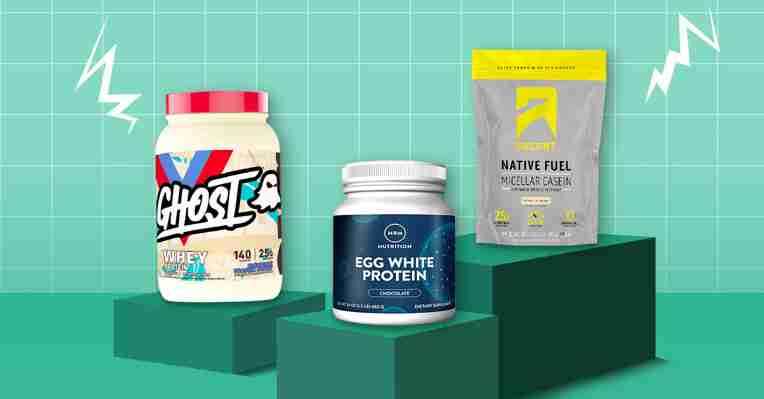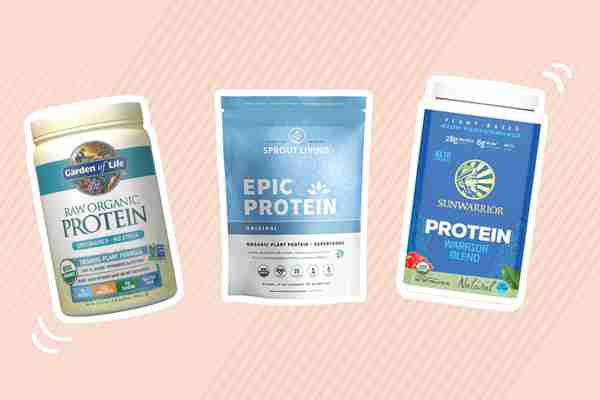The best protein powders to buy in 2022 – and how to choose the right shake for you
Protein powder was once a niche product, reserved for hardcore weight lifters and possibly pro sportsmen. Not any more. Today the benefits of protein are widely acknowledged – there's even Weetabix Protein – and the sports supplement industry in Britain is now worth £650 million a year.

If you've set a fitness goal for the New Year, then upping your protein intake could help you get there faster. Protein is a 'macronutrient', meaning the body requires large amounts of it as part of a balanced diet. Once absorbed into the body through digestion, protein is broken down into various amino acids which are then built into new proteins to help make red blood cells and building muscles, as well as other functions of the body. For a gym goer, it's crucial after exercise, helping your muscles to recover and grow.
With the sports supplement market ballooning like a body-builder's bicep, today's protein-hungry consumers are faced with an overwhelming amount of choice. Scroll down for our guide to the 13 best protein powders and three best protein bars. But first, a nutritionist, a personal trainer, a former Olympic bobsledder and an ex-championship wrestler explain out what to look for when buying protein supplements.
How to choose the right protein
Whey protein powder
The most common types of protein shakes are made from whey, a byproduct of cheese production.
"Whey-based proteins can be broken down into three main subcategories", explains Chris Hall, Founder and Executive Trainer at Hall Personal Training. "Whey protein concentrate, isolate and hydrolysate."
Hall ran us through the pros and cons of each category.
Whey concentrate
The pros, according to Chris: "Concentrate is the cheapest option, it tends to mix the best in water and it tastes the best".
The cons: "It sits at around 80% protein. You’ve got carbohydrates in there – about 5 grams of carbohydrate per serving and 3 grams of fat. It's also got lactose in it."
Whey protein concentrate supplements are widely available from retailers such as Protein World and Bulk Powders. You'll also find them on the high street, in one of the many supplement shops that have sprung up over the past few years.
Whey isolate
Pros: "It has been filtered through a different process to concentrate, and has had the fat and the carbs removed. The protein content is way up to about 90% protein. It contains little fat and very little carbohydrate. You’ve also got almost zero amount of lactose. It’s about 99% lactose free, so for people who have a lactose problem, isolate is one they can normally tolerate. Lastly, it’s okay as a taste."
Cons: "It doesn't mix very well."
Popular retailers for isolate formulas include Bulk Powders and MyProtein. "For quality, price and taste I’d go with MyProtein", says Keith McNiven, owner of Right Path Fitness and a former championship wrestler. "It’s really good value, really good ingredients and the taste is not bad."
Whey hydrolysate
Pros: "It’s been filtered through again – it’s pretty much 95% protein. Hydrolysate is really fast absorbing so if you have a thorough session or you’re doing two sessions in a day, it can be absorbed really quickly into the muscles. It also contains digestive enzymes naturally within it which helps to break it down slightly better and that’s why it is slightly faster absorbing."
Cons: "It's the most expensive, it doesn’t taste very nice, and it doesn’t mix well."
Popular Hydrolised formulas are available from MyProtein and Solgar.
If you can't decide which is for you, there are proteins on the market that blend different combinations of whey formulas.
Plant-based protein powder
There are advantages to choosing vegan protein supplements, even if you're not vegan.
"The key is to have cofactors and the superfoods in there", says Rick Hay, author and Nutritional Director at Healthista. "If your antioxidant intake is up, your immune system’s going to be up, so you can train harder and longer."
"Plant-based proteins are also less antagonistic to the gut," he says, and points to vegan bodybuilders or boxer David Haye as an example of an athlete who uses plant-based proteins to help build muscle. This study published in February 2017 found that plant-based proteins can build muscle just as well as other forms of protein.
When choosing a plant-based protein, select a blend such as formulas available from MyProtein, The Protein Works or VivoLife as these will provide a fuller amino acid profile than proteins based on single plant-based proteins. You can add them to healthy smoothies containing fruits, vegetables, seeds and spices for an energy boost.
"When considering a protein supplement, consider what your goal is first", says Tom Oliver, a nutritionist and founder of Tom Oliver Nutrition. "Is it to lose fat and tone up, or for performance or mass building? I would also suggest a shake that actually tastes great (many don’t) and one that you look forward to consuming. Consistency is key and liking and even enjoying the shake will go a long way to ensuring you’re able to stick to the task."
Burn fat and tone up
"If you're trying to lose weight you can replace one or two meals during the day with a healthy protein smoothie but you would have to snack healthily", suggests Hay. Diet proteins available from Tom Oliver Nutrition or The Protein Works will do for this, or opt for one of the plant-based blends mentioned earlier.
McNiven's advice is to keep it simple. "Have a balanced diet and supplement with standard whey protein rather than anything full of carbohydrates", he suggests. "Have a protein shake after the workout." Opt for Isolate or Hydrolysate, and avoid blends with additional carbs.
Lastly, stick to shakes or smoothies over other forms of supplement. "Protein bars will tend to contain added sugars, which is likely to provide too much energy if your aim is weight loss or maintenance", says Joanne Hart, Nuffield Health nutritional therapist.
Muscle building
There's no need to drink more than around two protein shakes a day when you are trying to build muscle. Hay suggests having a shake after the gym and at one other time during the day such as just before bed.
Allyn Condon, a Double Olympian and General Manager of The Gym Bristol Longwell Green, concurs. "From when I was competing as an athlete in Bobsleigh and even now in the gym, I’ve almost always had two shakes a day. One shake straight after training, and one shake before bed." His choice is PAS MGF-1, not least because he likes the taste. He has a casein-based protein before bed because it takes up to six hours to digest - it's essentially a liquid equivalent of slow-digesting cottage cheese.
There has only been one point in Condon's career when he introduced an extra shake a day.
"When I went into bobsleigh, my weight was maybe 78 kilos and based on the dynamics of the team I needed to push my weight up maybe about 10 kilos, so I had to increase my protein slightly. I would normally take between 25g protein in a shake. I pushed that up to maybe 35-40g protein. I introduced an additional meal replacement which would have been higher in carbs as well, just to try and push the weight up."
Such a high intake is beyond the bounds of what most people require, but meal replacement shakes such as MyProtein's Macro Meal can be a good choice; they contain a mixture of proteins, carbs and healthy fats, and are suitable for days when you might be unable to find a protein-rich meal.
As a mass-building base protein for a shake, Gaspari Nutrition Myofusion Advanced Protein contains a mixture of concentrate, isolate, hydrolysate and casein, and tastes nice too.
Boost your energy
"A protein shake by itself will feed and maintain your muscles but isn't going to give you energy", says McNiven. "You’ll have to put something with it, such as a pre-workout supplement or a blend. Ultimate Nutrition gives a mixture of everything - you've got to be careful because there's a lot of caffeine in there. Alternatively you could have a whey protein shake, a couple of bananas and a coffee."
When in a rush, McNiven sticks oats, protein, almond butter, stevia and coconut milk in a blender and has that for breakfast.
Hay recommends sticking to smoothies, and using a protein powder such as SunWarrior Classic Plus that contains the superfoods quinoa and amaranth, which can provide a natural energy boost.
Best protein powders 2022
1. Protein World Whey Protein Concentrate
£36 for 1.8kg, Protein World
The 16 Best Protein Powders of 2022: Whey, Casein, Plant-Based
We include products we think are useful for our readers. If you buy through links on this page, we may earn a small commission. Here’s our process.

With so many options out there, we’ve broken down the best protein powders in a variety of categories to help you find your match made in protein heaven.
Protein is an important macronutrient that benefits your immune system , keeps your organs functioning, and helps control your appetite .
You don’t need to be an avid gym-goer to incorporate protein powder into your diet. It’s true that it helps build muscle, but the right protein powder can do way more than that.
To pick the best protein powders, we looked at the following criteria:
1. Best-tasting protein powder
Type whey isolate, concentrate, and hydrolysate Price $$$ (for 2 pounds) Calories 120–140 Protein 25–16 grams (g) Carbs 2–5 g Sugar 0 g (blueberry toaster pastry flavor has 1 g) Flavors cereal milk, peanut butter cereal milk, fruity cereal milk, cinnamon cereal milk, coffee ice cream, blueberry toaster pastry, and milk chocolate How to take it Add it to your milk to make it taste like you just finished a bowl of cereal. Certifications N/A
You just can’t look past these flavor options! What tastes better than that last gulp of milk from the bottom of your cereal bowl?! Many reviewers mention that it satisfies sweet cravings without all the sugar.
A bonus for those with a soy allergy is that this brand uses sunflower protein. All flavors are soy- and gluten-free (except blueberry toaster pastry, because it has actual toaster pastry inside
The 7 Best Organic Protein Powders, According to a Dietitian
We independently research, test, review, and recommend the best products. Healthcare professionals review articles for medical accuracy. Learn more about our process. If you buy something through our links, we may earn a commission.

With so many protein powder options on the market, it can feel overwhelming to select the best product. Choosing an organic protein powder, when possible, ensures that you are getting a high-quality protein from a clean source. Specifically, the term “organic” means that protein powder is free of hormones, antibiotics, and pesticides.
“When shopping for a protein powder it is best to start by evaluating your health goals and needs. For example, if you are looking to build muscle primarily then a whey protein would be helpful," says Dr. M. Kara, founder of KaraMD Natural Supplements. "Once you take a look at your goals and needs, the next best step is to look for protein powders that are organic or locally sourced” she adds.
Even though organic protein powder may have a higher price tag, the health benefits and taste will likely outweigh the price in the long run. While it's debated whether or not organic foods contain higher levels of nutrients than the non-organic variety, it's believed that exposure to pesticides through diet has a potential association with cancer and may cause neurodevelopmental issues.
Whether you're looking for whey or plant-based protein, a flavored or natural variety, there are many organic options to suit your individual needs.
What to Look for in Organic Protein Powders
Certifications:
Look for the USDA Organic Certification seal or the term "Organic" on the packaging. Foods labeled as "Organic" must contain at least 95 percent organic ingredients (except for water and salt).
Taste:
As nutritious as protein powders may be, some are far from delicious and can have chalky aftertastes. Fortunately, there are plenty of options out there that contain all the protein you need but taste good as well. Many are available in a wide variety of flavors, or even an unflavored variety, so you can find what works best for you.
Protein:
The amount of protein you want in a powder will depend on your goals. Some are designed for weight loss, while others are designed to bulk you up, so you want one that helps you reach your goals rather than impedes them. There are also various types of protein sources to consider as well, including whey and those made from plant-based ingredients like peas, brown rice, or hemp.
Other ingredients:
Beyond protein, protein powders can contain vastly different ingredients. From those with just a few ingredients to those that contain added nutrients, you’ll want to find one that helps you meet your goals. If you have any dietary restrictions, there are many alternatives out there that are free from common allergens, such as soy, wheat, and nuts, too.
Organic Protein Powder Dosage
Always speak with a healthcare professional before adding a supplement to your routine to ensure that the supplement is appropriate for your individual needs and which dosage to take.
The DRI for daily protein intake is 0.8 grams of protein per kilogram of body weight per day for adult men and women, and it is widely accepted that protein needs increase with activity level. Studies have shown no safety concerns at daily recommended intakes up to 2.0 grams of protein per kilogram of body weight a day.
Frequently Asked Questions Are organic protein powders safe? Organic protein powders are generally safe to consume for most people. Studies have demonstrated no safety concerns with recommended daily protein intakes for athletes taking up to 2 grams of protein per kilogram of body weight each day. It’s important to consider if the protein powder you choose has other ingredients added besides the protein source. For example, some protein powders may have caffeine added. Studies have shown caffeine to be reasonably safe up to 400-500 milligrams per day for some adults, but in excess it may cause unwanted symptoms including nausea, vomiting, arrhythmia, and tachycardia. Read the ingredients label and nutrition facts panel for information about all ingredients in your protein and the amount added.
How are organic protein powders produced? Organic protein powders can come from plant or animal sources, and are produced from certified organic ingredients. Protein powders come in three main forms: concentrates, isolates, or hydrolysates. To make protein concentrates, heat or enzymes are used to extract the protein from a starting material, such as liquid whey. Protein concentrates contain some carbohydrates and fat. Protein isolates are made by processing out the carbohydrates, fiber, and fat from the protein source. Isolates contain at least 90 percent protein and are the purest form of protein powder to purchase. To make protein hydrolysate, heat or enzymes are applied to the long amino acid chains of a protein concentrate or isolate. This breaks down the amino acid chains into shorter molecules for easier digestion
What is the difference between organic protein and regular protein? There is little to no nutritional difference between organic protein and regular protein. But the ingredients used to make organic protein must be Certified Organic. There are several agents authorized to certify businesses and farms according to USDA organic regulations. No organic foods and food products have been grown using genetically modified organisms, synthetic fertilizers, or pesticides.
For processed foods and products with more than one ingredient to be certified organic, they must not include artificial flavors, colors, or preservatives, and all ingredients must be organic. This applies to protein powders, so if you prefer products without artificial ingredients, Certified Organic ones are a good choice.
Do organic protein powders expire? It’s important to understand the food product dating posted on protein powders to understand if they’ve expired or have gone bad. These dates are not based on food safety, but rather they are based on the quality of the food product. A “use by” or “best by” date indicates when that product will provide the best flavor and quality. A “sell by” date indicates to stores how long to display the product in their inventory. Since organic protein powders are low in moisture, they are not likely to spoil with potentially harmful microorganisms like bacteria and mold when stored in a cool, dry environment. However, to ensure the best taste and quality, it is recommended to enjoy your protein powder by the “use by” or “best by” date, if provided.
How We Select Supplements
Our team works hard to be transparent about why we recommend certain supplements; you can read more about our dietary supplement methodology here.
We support supplements that are evidence-based and rooted in science, as well as clinically tested and approved for use in humans. We value certain product attributes that we find to be associated with the highest quality products. These attributes include non-GMO, Organic, and allergy-friendly products that are free of most artificial ingredients including colors, flavors, preservatives, and sweeteners. When possible, we recommend products that are third-party tested and certified.
It's important to note that the FDA does not review dietary supplements for safety and effectiveness before they go to market. Our team of experts has created a detailed, science-backed methodology to choose the supplements we recommend.
Here, the best options for organic protein powders:

